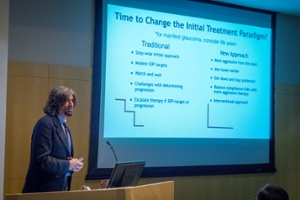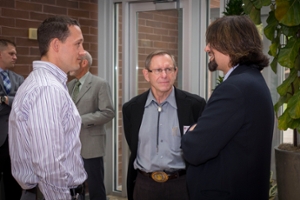
John A. Moran Eye Center alumnus Iqbal "Ike" Ahmed, MD, FRCSC, will tell you he is not afraid of controversy.
"Challenge the norm. Challenge what we do…but do it respectfully," Ahmed advised residents while giving Moran's 2017 Resident Alumni Day keynote address on May 19. "That is something I think I learned here at Moran."
Ahmed's mantra has paid off since he completed a glaucoma fellowship under the mentorship of Moran's Alan S. Crandall, MD, in 2001. Now an assistant professor at the University of Toronto, Ahmed is internationally recognized for his expert diagnosis and surgical treatment of highly complex eye diseases, and for developing the micro-invasive glaucoma surgery technique known as MIGS. He is also known for developing advanced microsurgical devices and instruments, such as a diamond scalpel for glaucoma surgery.
In his keynote, "Rethinking Surgery as First Line Glaucoma Therapy," Ahmed challenged ophthalmologists to reconsider the role of surgery in treating glaucoma, an eye disease characterized by fluid buildup that increases pressure and damages the optic nerve. Citing evidence that current targets for eye pressure often do not stop progression of the disease over the long term, Ahmed argues physicians should lower accepted targets, maybe even as low as 12 mmHg, for patients with moderate disease and consider surgery earlier on in treatment. Ahmed pointed to studies showing glaucoma patients who had surgery earlier on experienced less vision loss over the long term.
"I think we are changing the paradigm a bit...I can tell you, at least in my clinic we are introducing surgery at an earlier time, whether combined with cataract or as a stand-alone procedure," said Ahmed, who added advancements in surgical technology are making procedures safer.

Moran's Resident Alumni Day is an annual forum for residents to showcase their latest research, a priority of the residency program. Residents have dedicated research time and mentors. Ahmed, who received Moran's 2016-2017 Distinguished Alumni Award, credits his year at Moran for showing him his potential.
"I think there are a lot of people with great potential but sometimes they have to be shown that," he said. "They need to have the right environment and the right mentors to foster that."
Moran Chief Resident Julia Byrd, MD, agreed, noting the strength of the residency program lies in its combination of clinical experience, mentorship, autonomy, and outreach.
"Not only is the clinical and the surgical training amazing here, but I think the people I've met and the culture really set Moran apart," she said.

Crandall, who co-chairs Resident Alumni Day, said the profession needs more people like Ahmed, who not only provides excellent patient care, but takes time to "share his knowledge with the world." He hopes Ahmed's example will inspire the next generation of ophthalmologists.